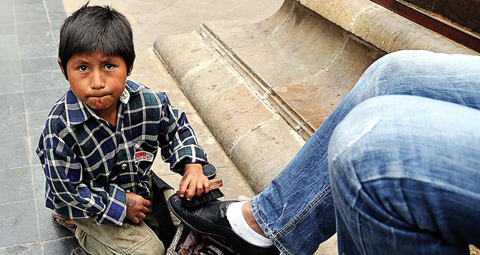October 12 | ![]() 0 COMMENTS
0 COMMENTS ![]() print
print

Giving street kids a leg up
In the second of a three-part series GERARD GOUGH looks at Missio Scotland projects around the globe to convey how the kindness of Scottish schoolchildren is transforming young lives globally.
DURING my time as Missio Scotland’s communications officer, I have been most heartened and greatly enthused by my interaction with Catholic school communities, where I have gained an insight into some of the excellent work many have undertaken in support of Missio Scotland, the Scottish branch of Pope Francis’ own charity, the Pontifical Mission Societies (PMS).
Having leafed through the Scottish Catholic Observer’s archives and taken a look at some of the historic information available to us within the office, I was impressed at the extent of support from schools and the different ways in which it has manifested itself—much of which I was able to detail in last week’s feature.
It is safe to say that by supporting our work, both spiritually and financially, our school pupils have fulfilled and are continuing to fulfil their call to be missionaries—an integral part of our Faith—and living out the motto for our Missionary Children Society of ‘Children Helping Children.’
To that end, I am often able to inform the pupils, when I visit schools, of some of the children throughout the 180 countries and 1,100 dioceses on five continents that we are able to provide support for, thanks to their generosity.
To illustrate this, I’d like to share a story from each continent about how our children have made a difference to the lives of their brothers and sisters throughout the world in a number of diverse ways through their support for Missio Scotland.
Hopefully by sharing these child-focused projects that are supported by Missio
Scotland and our worldwide partners in the Pontifical Mission Societies, you will gain an insight into just some of the fantastic projects that our children—your children—are assisting with as a result of their support for us. In doing so, they are playing their part in the Universal Church and directly helping the Church to give life and hope to people all over the world.
Nepal
In Nepal, most families have neither the information nor the resources to care for a child with special needs. Those children are sometimes seen as being cursed, leading to a life of exclusion and shame. For a family already struggling to make ends meet, having a disabled child can seem like an impossible challenge. However, it is a challenge the Navjyoti Centre in Kathmandu—bolstered by the PMS—is willing to tackle head on.
The centre is a day school for children with developmental disabilities that brings dignity and understanding to their otherwise very difficult lives. Around 80 children come daily to Navjyoti Centre. Most arrive in a bus donated by the Indian embassy.
Lisa Perekkatt, from the Sisters of Charity of Nazareth, together with the 15 teaching and supportive staff work with these children from 10am to 3pm.
Committed teachers accompany the children from the time they come to the centre until the last one leaves. Some teachers have been here for more than 25 years.
Many of their houses are damaged and unsafe to live in and others lost their houses entirely. But many worked along with the Sisters in distributing earthquake relief at Koshidekha and Baniyatar.
Navjyoti, which mean’s ‘new sacred flame,’ bridges the gap for disabled children, giving them a safe place to be themselves and learn life skills. The curriculum is tailored to each student’s needs. Some play games, while others go to speech therapy or practise reading, writing and maths. For the most able, the centre offers classes in vocational skills like bike repair or making candles, giving them a way to contribute to their families and boost their self-confidence.
Some of the children have even taken part in the Special Olympics. Many have received trophies in sports. They spend time in indoor and outdoor games. Art, music and dance are all part of the lesson plan. They also enjoy the annual picnic and tours around Kathmandu, and are given opportunities to celebrate festivals and holidays.
All is done to ensure the children are loved, integrated into society and have fun!
The centre is full of hope and joy, and an inspiration to us all.
Albania
Closer to home, but in the midst of poverty too, Sr Tone Qeta of the Angelic Sisters of St Paul in the village of Fushe-Milot, Albania, turned to the PMS for help.
Fushe-Milot is in a part of the world we don’t normally hear much about. The village is becoming crowded as families leave the impoverished mountain regions in hope of a better life. But the village lacks the resources to cope; even electricity is only periodically available.
Most adults are without employment, teenagers and young adults emigrate when they can and the children are left with very little, the streets being their main playground.
However, with funding from the PMS, Sr Tone has been able to give basic nutrition to those children who otherwise would have very little to eat.
“The children that frequent our nursery school come from poor families that have on average four children,” she said. “This project was born of the necessity to nourish them.
“We have worked here for three years with children between the ages of 3-6 years old, managing a nursery school. This has helped us understand the reality and respond to the needs of local families. Our attention has been particularly aimed at young children of pre-school age and the education of women, to help mothers rediscover their dignity.
“The variety of food we offer for the children is a luxury. We thank you from the heart for the money which you have sent. This money has been for our centre a precious manna—like from Heaven! We started with 58 children, but the number is always rising.”
Bolivia
In Camiri, in the south-east of this South American country, many children aged as young as 10 shine shoes so they can afford to support themselves. The PMS seeks to improve their chances of a better future by giving the shoe-shiners a nutritious lunch each day for which they, in return, are expected to attend school regularly.
Mgr Leonardo Bernacchi of the Apostolic Vicariate of Camiri explained that many of the children have family problems, live on the streets and are open to abuse and exploitation. Two lay volunteers make sure the children have at least one good meal a day and offer some guidance and support.
The PMS helps many other positive projects for the children of Camiri. These include funding communal kitchens and dining rooms, children’s homes and boarding schools and providing school materials. Mgr Bernacchi says there is a continuous stream of abandoned children and mothers at the Vicariate asking for food and school equipment, such as books and pencils.
In Camiri, the indigenous Guarani have been displaced by other peoples who came to the area after the discovery of oil in the 1920s. Now the oil wells are exhausted and most people—especially the Guarani—live in extreme poverty. The population is very young with 40 per cent aged under 20. Family life is unstable with men often deserting their families. Many children pass into the care of their grandmothers while their mothers earn a pittance working as washerwomen or house servants. They have little money to spend on their children’s food and schooling.
“Responding to the great number of children in poverty and neglect we have asked for help to alleviate their situation at least with the children’s necessities,”
Mgr Bernacchi said. “With your help we are giving the shoe-shiners of Camiri a better future.”
Malawi
In Malawi—an African country with strong ties to Scotland—the construction of a new school block in the district of Dowa was recently completed. The Nambuma Boys Primary School now has two new classes due to funding from the PMS.
Fr Francis Lekaleka, director of the PMS of the Archdiocese of Lilongwe, urged parents to ‘support children in their education and in their spiritual life,’ and also invited the children to be generous with each other, just as other children were generous to them, in supporting the construction of the new school building. He also thanked Archbishop Tarcisio Ziyaye for having identified the Nambuma Boys Primary School as one of the beneficiaries of Missionary Children funds this year.
The opening ceremony took place on May 16 in the presence of chiefs and people from the surrounding
villages. It was a colourful event at which schoolchildren performed, sang and danced. One of the chiefs thanked everyone for the new building, which he described as a ‘blessing of God.’
A representative of the Ministry of Education, Ms Chunga, also praised the project. She said: “This is the kind of development we expect from the Church. The ministry urges you to continue these projects in other schools.”
Fr Samson Kumkumbira, parish priest of Nambuma parish, gave thanks to the PMS for its timely
intervention and asked students and the community to take care of the new building.
Papua New Guinea
Kerema is one of the poorest towns in Papua New Guinea. The town is extremely isolated without road links to the island capital Port Moresby, or to any other province. The northern and western hinterland are not accessible and to the south lies only the sea. Up until a few years ago the town of Kerema was welcoming regular shipping services. However, now all of this has stopped and shipping comes to the town only through expensive charters. Due to this, resources and facilities are very limited and in high demand. Store goods are sold at some of the highest prices in the country.
The Diocese of Kerema was established in 1976. The relatively new diocese comprises 11 parishes. Of a population of just more than 100,000 people, Catholics in the diocese make up just over 10 per cent. The isolation of the diocese and the limitation of resources means that children are being greatly affected. Each day, the number of children suffering from malnutrition and the illnesses brought on by poor diet is increasing.
Although it is only a small town, Kerema has a lot of street children. They do not go to school because then can neither pay school fees nor have family to look after them. They wander around the church compound but often end up in police custody for alleged acts of theft.
The Church—supported by the PMS—is currently providing a teacher for 50 children, as well as meeting their basic need for clothes and food.
How to help
To learn more about Missio Scotland you can visit: www.missioscotland.com, www.fb.com/missio.scot, Twitter @Missio_Scotland or email: [email protected]
To donate, visit: www.missioscotland.com/donate, phone 01236 449774 or send donations to:
Missio Scotland, St Andrews, 4 Laird Street, Coatbridge, ML5 3LJ.











